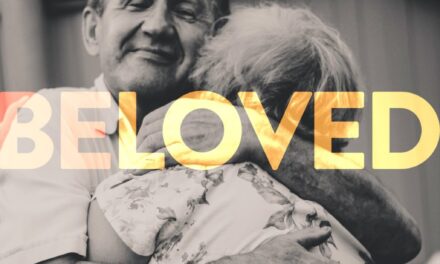A woman suffering hemorrhages for twelve years came up behind him and touched the tassel on his cloak. She said to herself, “If only I can touch his cloak, I shall be cured.” Jesus turned around and saw her, and said, “Courage, daughter! Your faith has saved you.” And from that hour the woman was cured.
(Matthew 9:20-22)
This well-known passage is often cited for the importance of faith, but in Matthew’s brief account we hear Jesus encourage the woman with the haemorrhage by simple saying, “Courage!” This is an important thing in the life of faith. In fact, it’s a gift of the Holy Spirit according to the Christian tradition. I remember a few years ago when I was on the 30-day Spiritual Exercises as a Jesuit, my director, without fail, at the end of every daily direction session would say, “Courage!” Prayer can be frightening and this single word helped me move through next day with courage for what God might reveal next. Prayer—and faith—is frightening because it reveals parts of our lives and ourselves that can be dark, sinful, and filled with fear. They’re the parts we are afraid to admit we have, and it’s courage that reminds us that God can heal.
More than physical
But one of the even more fearful parts of the Spiritual Exercises for many who use it as a discernment tool is that God may surprise you with a call you never expected. Even the “expected” call of Christ to his universal mission is scary because of its uncertainty. Take no sandals, stick, or money, Jesus tells his disciples. What? No security for the journey? Life is often unsecure and requires courage to face. This is why Saint Ignatius says of retreatants:
“It is very helpful to him who is receiving the Exercises to enter into them with great courage and generosity towards his Creator and Lord, offering Him all his will and liberty, that His Divine Majesty may make use of his person and of all he has according to His most Holy Will.” (5th Annotation)
Inner strength
The word courage comes from the Latin cor meaning heart, a symbol of inner strength. Perhaps my retreat director’s encouragement was influenced by Ignatius’ exhortation to directors to give their directees courage:
“If he who is giving the Exercises sees that he who is receiving them is in desolation and tempted, let him not be hard or dissatisfied with him, but gentle and indulgent, giving him courage and strength for the future, and laying bare to him the wiles of the enemy of human nature, and getting him to prepare and dispose himself for the consolation coming.” (7th Annotation)
“The enemy of human nature” – It’s our weakness that discourages us, but the strength of the human spirit, certainly in the context of God, embodies courage like that of the haemorrhaging woman whose courage and faith led not only to physical healing but a deeper life and calling with God. It’s courage that allows us to just dive in and take a spiritual risk, with greater trust that our Creator has a hand stretched out saying, “Don’t worry, I’ll lead the way.”
| Read this recent post on dotMagis’ blog called Take Courage. |
Related posts:
Listen to an audio version of this post…
Music by Kevin McLeod









Courage is good. I like generosity myself. Sometimes, as a feminist doing the Exercises my own sensitivity gets crumpled. This is when I remember to be generous and to go into the exercises with courage I guess but also generosity. And I have never regretted to do so.
Thank you for accepting me as one of the subscriber of this A giving Heart?God in all things
I was challenge of the experience of that family. I learn a lot of things
courage is somthing helps you to move on of what you are now.